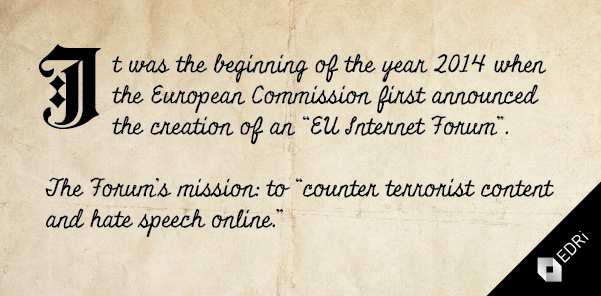The tale of the fight for transparency in the EU Internet Forum
Chapter One: The dark knights at a secret meeting
It was the beginning of the year 2014 when the European Commission first announced the creation of an “EU Internet Forum”. But it would take almost two years and several meetings before its official launch on 3 December 2015.
The Forum’s mission: to “counter terrorist content and hate speech online.”
Its actors: something of a “secret society” consisting of almost exclusively US internet companies (Microsoft, Facebook, Twitter, Google and Ask.fm), government officials and law enforcement agencies.
Its modus operandi: meetings behind closed doors to discuss undefined “terrorist material” and badly defined “hate speech”, creating pressure on industry to monitor and censor online communications without any accountability for the outcome.

Behind the curtain, the Commission’s initiative encourages internet companies to take “voluntary” actions. It is supposed to trigger a response to a very diverse range of possibly illegal or legal but unwanted online activity. This appears to mean monitoring European citizens and censoring of online content by private companies without appropriate oversight.
Chapter two: The battle for transparency and freedom of expression
No information about the Internet Forum has been made public from the start of the initiative. So in order to make sure the EU Commission keeps this project in line with fundamental rights obligations, EDRi made several access to documents requests via the AskTheEU.org portal. At the end of April 2015, we submitted a request to receive information about the participating businesses, objectives and tasks of the Forum, minutes of meetings and a list of upcoming meetings, and timeline of the work of the Forum. The EU Commission repeatedly denied us access to the documents discussed by the Forum, or provided us only with heavily redacted documents.
After months of obstruction from the European Commission, we made a complaint to the European Ombudsman for being wrongly denied full access to two documents. As a result, in April 2016 the Ombudsman launched an investigation into the European Commission’s failure to disclose information of the EU Internet Forum.
The Commission argued that it had to refuse access to these documents to protect public security and its decision-making process. In response to the Ombudsman’s investigation, the Commission explained that if details of the initiative became public, it “would allow them [terrorist groups] to circumvent counter-terrorism measures”. This statement clearly confirms that the Commission discussed potential restrictions on the freedom of communication with industry representatives.
The saga continued as we responded in a letter to the Ombudsman in which we argued that as there is an impact on fundamental rights of citizens, the Commission is obliged to at least make the underlying legal basis or reasoning public.
Chapter three: The poisonous fruit
While no civil society organisations were invited to attend the discussions on terrorism, EDRi was invited to take part in some of the initial discussions on online hate speech. However, we were systematically excluded from the negotiations that led to the voluntary Code of Conduct for IT companies.
With the publication of this official document in May 2016, the Commission handed over the leading role in countering hate speech to private companies with the power to arbitrarily implement their terms of service. This will – or has – almost automatically led to the deletion of legal content as a result of this voluntary and unaccountable take-down mechanism.
This agreement between only a handful of companies and the European Commission creates serious risks for freedom of expression and is likely in breach of the EU Charter of Fundamental Rights, under which restrictions on rights should be provided for by law, and “genuinely achieve objectives of general interest” (which cannot be assessed due to lack of oversight and meaningful reporting obligations).
EDRi took a stand that countering hate speech online requires open and transparent discussions to ensure compliance with human rights obligations. This means that we decided not to take part in future discussions of the Forum, confirming that we do not have confidence in the ill-considered Code of Conduct.
Epilogue
There is in fact no epilogue yet; the complaint case is not yet closed, and the future of the EU Internet Forum is still uncertain. The last meeting took place on 6 December 2016, again behind closed doors. Nevertheless, rights defenders came out of battle victorious. Our achievement was to shed a light on the activities of the Forum with the help of the AskTheEU.org portal, and thereby enable a public debate. The next initiative in this framework, an “Internet Forum Plus” project on cross-border access to electronic evidence has been diligent, carefully developed a problem definition and has been responsive and transparent so far.
The article was originally published at http://blog.asktheeu.org/2017/03/the-tale-of-edris-fight-for-transparency-in-the-eu-internet-forum/.
EU Internet Forum against terrorist content and hate speech online: Document pool
https://edri.org/eu-internet-forum-document-pool/
EU Commission under investigation for EU Internet Forum documents
https://edri.org/commission-under-investigation-eu-internet-forum/
Commission responds to Ombudsman investigation on EU Internet Forum
https://edri.org/commission-responds-ombudsman-investigation-eu-internet-forum/
Code of Conduct on Countering Illegal Hate Speech Online
http://ec.europa.eu/justice/fundamental-rights/files/hate_speech_code_of_conduct_en.pdf
(Contribution by Zarja Protner, EDRi intern)



